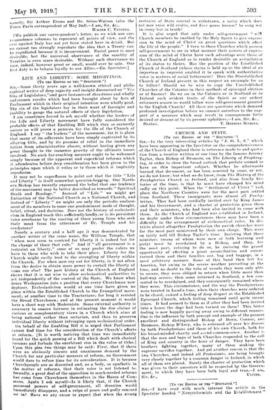CHURCH AND STATE.
(To THE EDITOls or THE " SPECTATOR.") SIR.—In the very interesting articles by "J. St. L. S." whirls have been appearing in the Spectator on the comprehensiveness of the Church of England there is reference made to and quota- tion from a treatise written at one time by the famous Jeremy Taylor, then Bishop of Dromore, on The Liberty of Prophesy- ing, in order to show the broad outlook that prelate seemed to have on this important subject. 'Whether he afterwards burned that document, as has been asserted by some, or not. we do not know; but what we do know, from The History of the Presbyterian Church in Ireland, and also from fancily his- tories of the time, is that he must have changed his mind sadly on this point. When the " Settlement of Ulster" took place the Northern Counties were for the most part Settled from Scotland. These immigrants were almost all Presby- terian. They had been cordially invited over by King James acid his Government, and a charter of protection given them and their ministers, who had been also invited to come with then,. As the Church of England was established in Ireland, no doubt under these circumstances there may have been a difficulty in the arrangement of ecclesiastical rules. In dis- tricts almost altogether Presbyterian the parish churches were for the most part ministered by their own clergy. This went on fairly well till Bishop Taylor's time. Insisting that these ministers (many of whom were men of both learning and piety) must be reordained by a Bishop, and they, for the most part, refusing to do so, he (missing the grand opportunity of effecting a great reconciliation and union) turned them and their families out, bag and baggage. in a most arbitrary scanner. Some of this band then left for America, but owing to the severe weather prevailing at the time, and no doubt to the tubs of vessels they were only able to secure, they were obliged to return when little more than half-way across; then some returned to Scotland, a few con- sented to be reordained, and they consequently remained where they were. This circumstance, and the way the Presbyterians were treated in Laud's time, when their churches were ordered to be closed, cacised a feeling of deep disgust at the Established Episcopal Church, which feeling remained until quite recent times. It had seemed to them as if after they had been invited into a house the dogs had been turned on them! This bitter feeling is now happily passing away owing to different reasons. One is the influence by both precept and example of the present excellent and distinguished Bishop of Down, Connor, and Dromore, Bishop D'Arcy, who is esteemed all over his diocese by both Presbyterians and those of his own Church, both for his broad-minded charity and sound common-sense. Another iu that the men and boys of both Churches responded to the call of King and country in the hour of danger. They have been brothers fighting together, many of them making the supreme sacrifice together. And yet another reason is that the two Churches, and indeed all Protestants, are being brought very closely together by a common danger in Ireland, in which all of them are placed. Surely the charter of protection which was given to their ancestors will be respected by the Govern- ment, to which they have been both loyal and true. —I am,






































 Previous page
Previous page